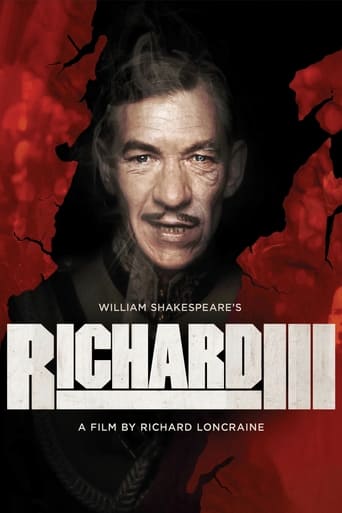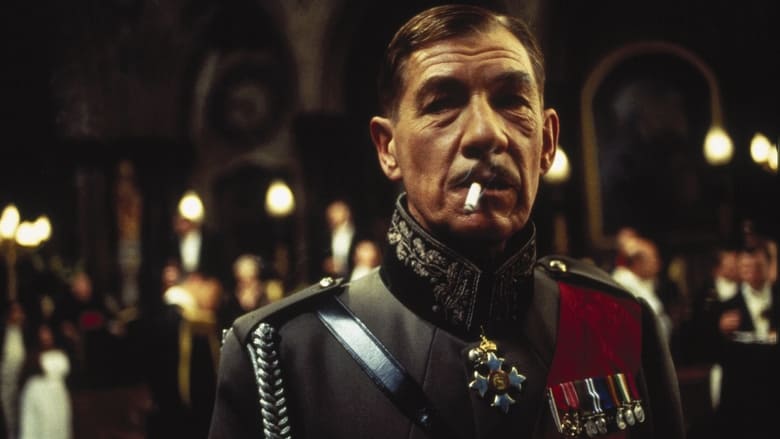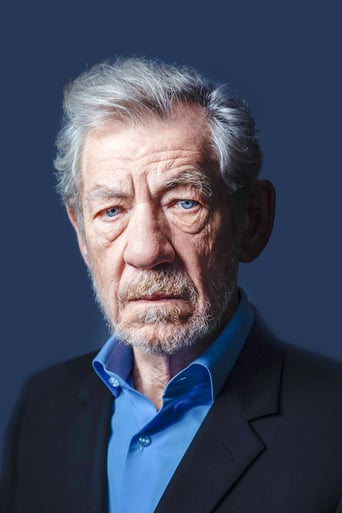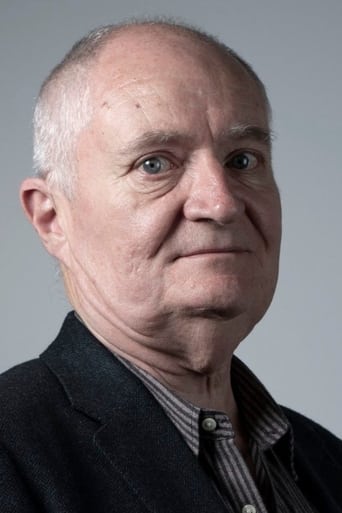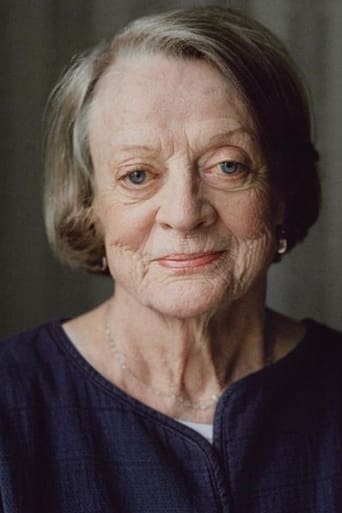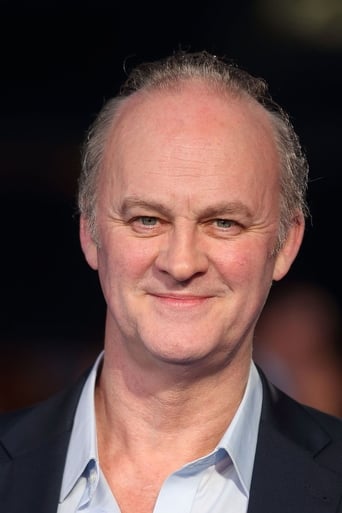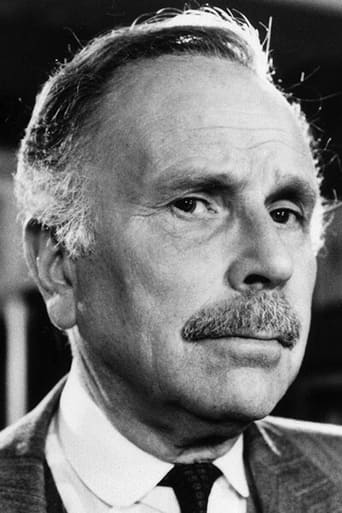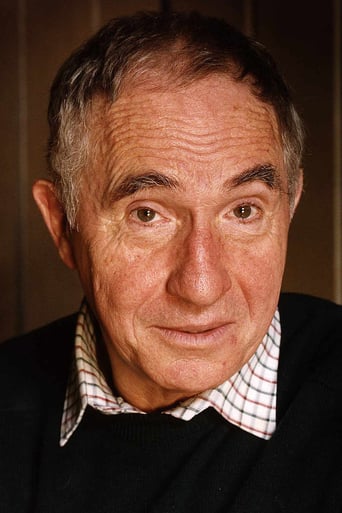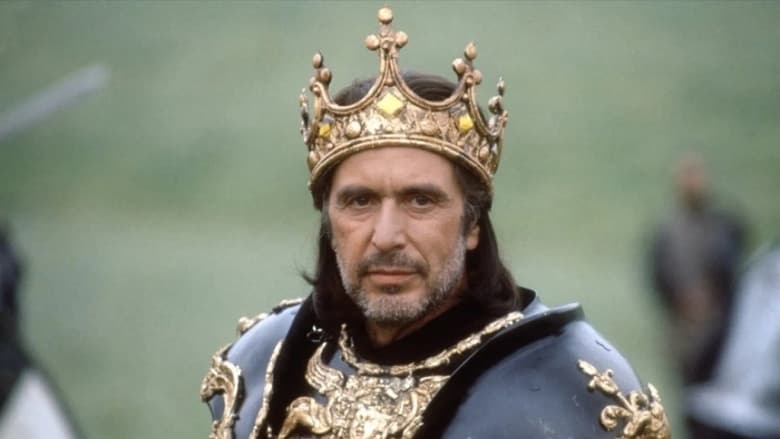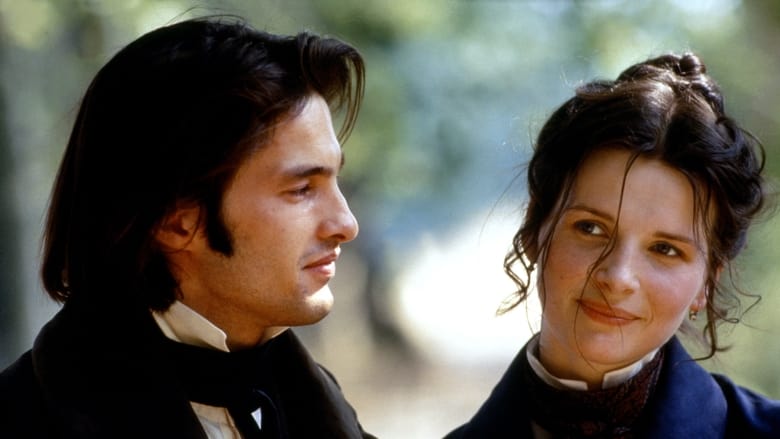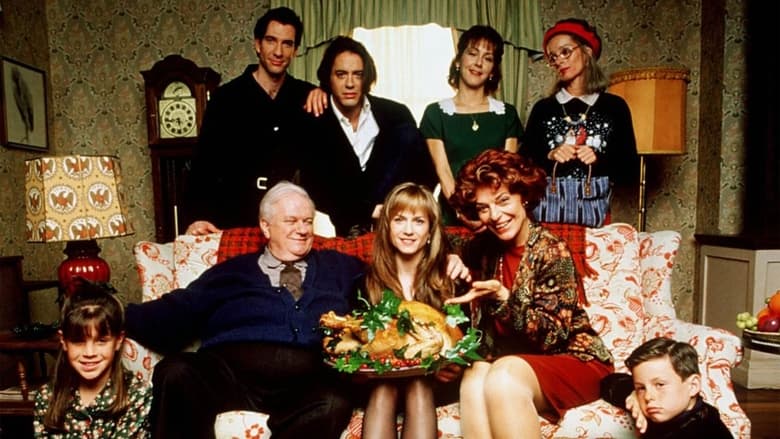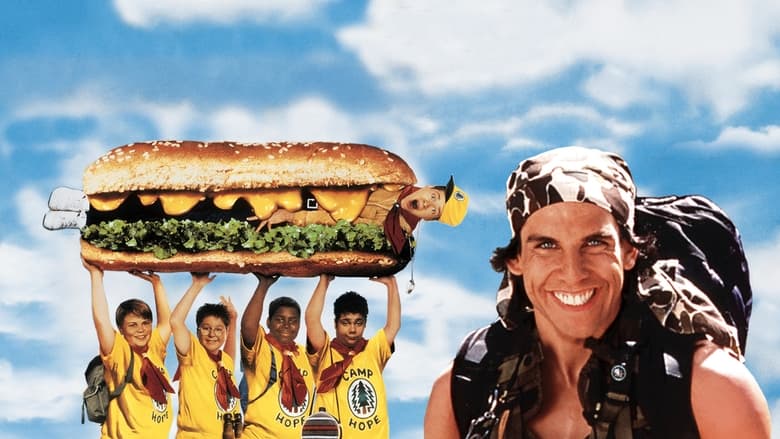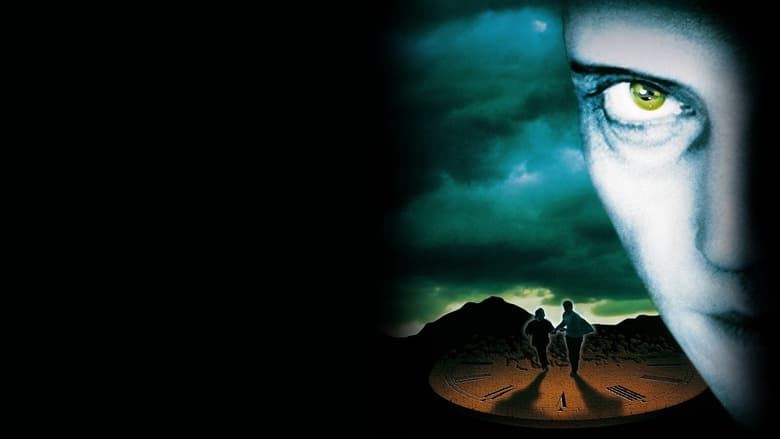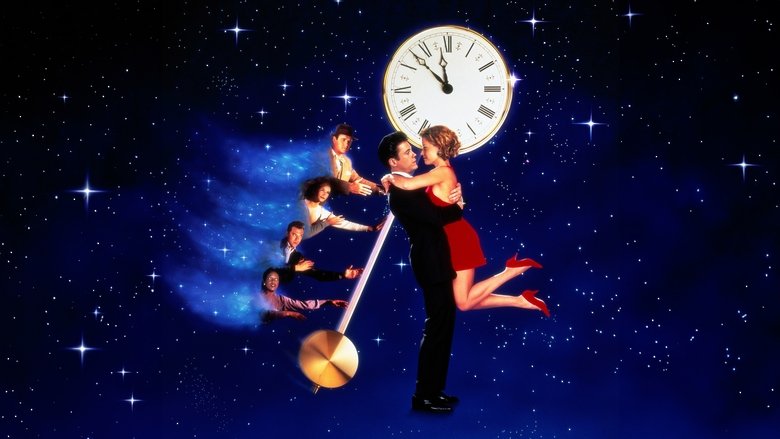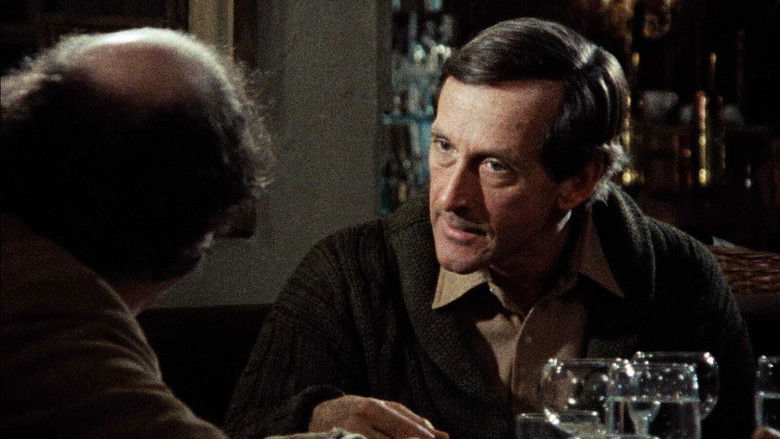A murderous lust for the British throne sees Richard III descend into madness. Though the setting is transposed to the 1930s, England is torn by civil war, split between the rivaling houses of York and Lancaster. Richard aspires to a fascist dictatorship, but must first remove the obstacles to his ascension—among them his brother, his nephews and his brother's wife. When the Duke of Buckingham deserts him, Richard's plans are compromised.


Similar titles
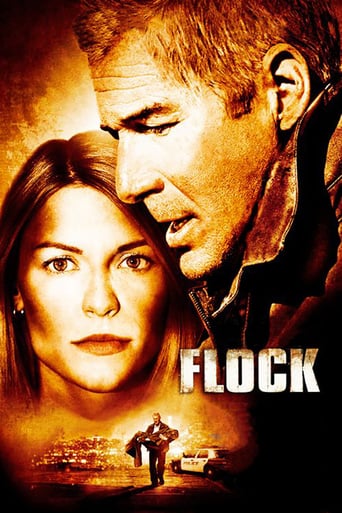
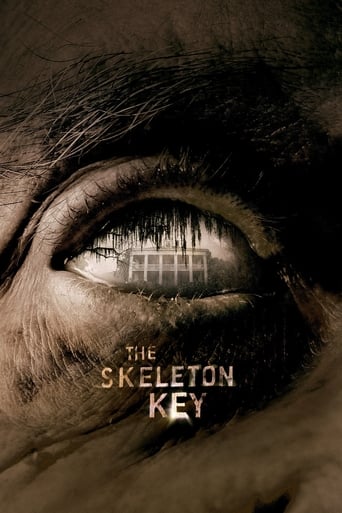
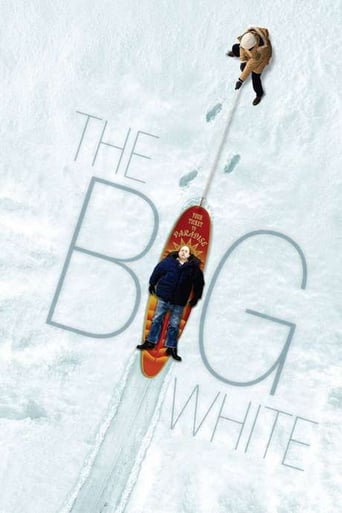
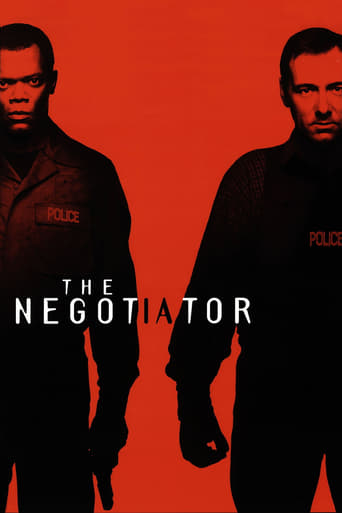
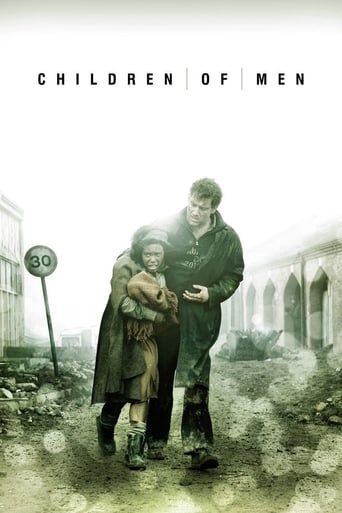
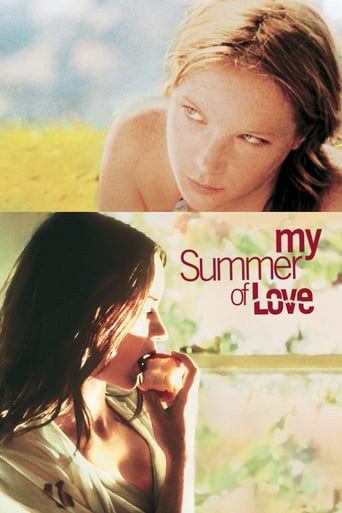
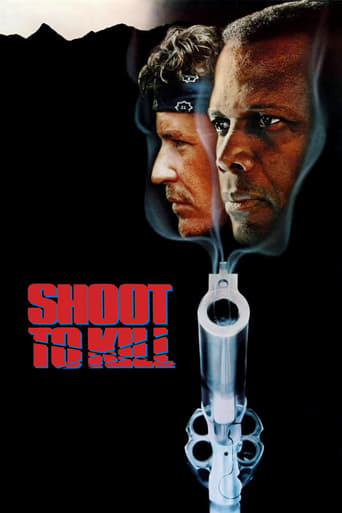
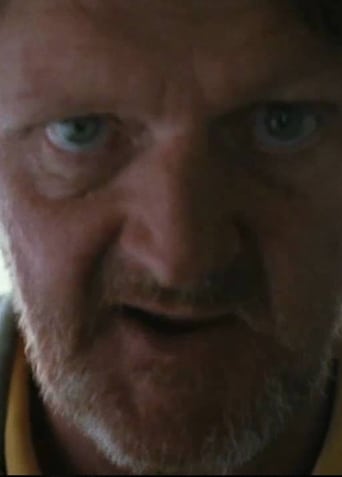
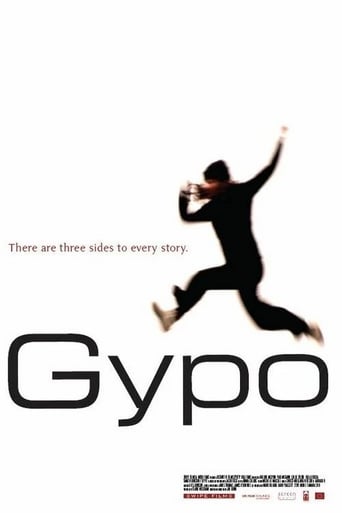
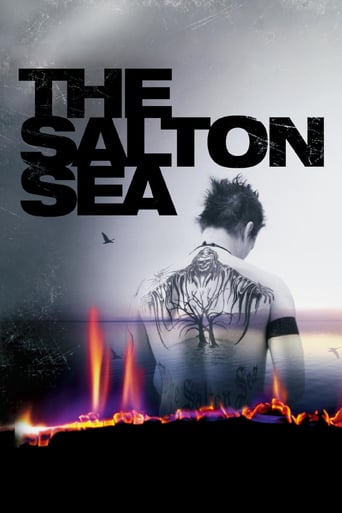
Reviews
Placing one of Shakespeare's history plays in another specific historical period is always a bit of a risky thing. Such a ploy more frequently works better on stage than on screen –our suspension of belief being somewhat more liberal in a theatre than in front of a screen. Often the transfer in time is to a "generic" future historical setting, with a bit of this period and a bit of that. Sometimes this works, sometimes it doesn't. The reason I think placing this version of Richard III in the 1930s works so well is the faithfulness to that conceit, which is carried through impeccably in every detail, though never in a forced or laboured way. It is a clever, often witty, adaptation of Shakespeare's masterly examination of one man's relentless pursuit of power –and has both elegance and a style of its own aside from the play it is based on, and a healthy respect of Shakespeare's glorious language and characters.Perhaps the language is what may deter some people from fully enjoying this, though I would argue that it merely demands paying a little more attention to what is being said than when watching a "normal" film. Contrary to what many may think, Shakespeare's language is not difficult or obscure –quite the opposite– but you do need to listen to it! Here, of course, you are helped by having some of the finest actors around, with not only great command of that language, but the ability to present clearly defined yet complex characters, so that we are able to keep track of who is who in the web of family connections and intrigue. The film is much shorter than the play (Shakespeare's longest), and does away with some characters and combines others into one figure. This polishes the narrative somewhat, but does not take anything vital away from the unfolding tale. I do, however, recommend going back to the original play if you enjoy this film, because it will give an even broader appreciation of the story. And what a story!Centre-stage (or centre-screen, in this case) is Ian McKellen as Richard. It is surely his finest screen performance, and is certainly the one that really made me appreciate his work when I first saw the film upon its original release. Like Olivier before him, his Richard is a performance perfected through countless performances on stage in the role, and with devilish charm he milks each ounce of scheming, determination and wickedness from his scenes. Yet, unlike Olivier, he also shares with us a certain clumsiness and even pathos, which though it does not excuse in any way his actions does give us some understanding of why he has become the grotesque figure he is.Of the other performances I particularly like Jim Broadbent's take on the Duke of Buckingham –his beaming face has eyes of steel, and he seems to be silently scheming, listening, and judging in every scene in which he appears. Anette Bening also does a terrific job and makes more much of her part than is written. But all the actors do wonders in conveying their own particular "angsts" and concerns. Seeing the film again now, I only wish it was longer and we saw even more of some of them.Finally I must applaud the designers of the production –both visual and aural– who have created a totally believable alternate English setting of the 1930s. It is both familiar and alien at the same time –which is what makes the film's central idea so chilling: That such a thing could have happened in England at this time as it did in Germany and Italy and Spain. Shakespeare may have been writing about the 15th century, but the scheming of despots, hungry for power, goes on and on and on.I rate this as one of my favourite Shakespeare films!
When I first saw this adaptation of Richard III, I didn't care for it. I hated the way Shakespeare's dialogue is chopped into bits and scattered around randomly. I thought the period details were crudely overdone. (Must every character smoke cigarettes in every scene?) And I just couldn't picture an aging, feeble Ian McKellen as a brutal rampaging tyrant like Richard III.Over time, though, I've come to appreciate the little things. The amazing supporting cast and the sexy background moments, like Robert Downey's fling with the stewardess that ends like it's Friday the 13th! And the happy ending for Richmond and young Princess Elizabeth.And by the way, it's not one moment, but the whole character arc for Lady Anne (Kristin Scott Thomas) who falls under Richard's spell and gradually fades away into a swoon of almost living death. The way she's always in the background, taking pills at one moment, then gulping down liquor, then at the end actually injecting herself with drugs in the limousine, you sense how she just wants to forget everything and fade into sweet oblivion. Yet you also sense she would have loved Richard if he could have shown her any kind of human feeling. Kristin Scott Thomas is perfectly cast as the exquisitely frail and helpless beauty.
I would not call this the definitive version of Shakespeare's Richard III due to its relatively brief length, but it is one of the best film adaptations of the play, if only for Ian McKellan in the title role.McKellan brings devilish glee to the part of Richard. Whether he's manipulating, murdering, or seducing, he's never boring to watch. That he has photos taken of the bodies of his victims adds a macabre touch to his villainy.The move from the 1480s to the 1930s was an unconventional but brilliant move on the part of the filmmakers. The story adapts well to an alternate fascist England. The sets, locations, and costumes are all well-suited to the pre-WWII period. The music is fabulous, evoking 30s jazz and adapting the classic sonnet "Come Live with Me and Be My Love" to a Depression-era love ballad style.If this film has a fatal flaw, it's the running time. 100 minutes is not enough and makes this feel more like a Cliff Notes version of the story than the real thing. The supporting parts are perfectly cast, but their parts are all so cut down that we don't get to connect to them the way we do in the longer 1955 Olivier version. The only supporting characters who get to leave much of an impression are Anne, Elizabeth, Edward, and the Duchess of York. Everyone else is barely there long enough to make much of an impression on the viewer.Nevertheless, this film is a lot of fun. The 1930s setting is well-realized and McKellan is great. But I still believe the Olivier adaptation is the superior film.
This is a filmed adaptation of Shakespeare's Richard III. Film has different constraints than stage, not the least of which is time. A three or four hour theatrical performance can be divided with an intermission for audience comfort and concentration. A stage production can get away with hinting while a film has to re-create verisimilitude. A stage production strongly suggests 'as if' --hence actors taking a bow after the performance--while a film must mean: this is it, the film actors wanting to convey a death actually occurred.So in film lots gets lost in translation. But in this adaptation of Richard III in a fascist state, the sense of Richard giving himself over to total evil is not lost. Richard III is not Lear, or Othello, or Macbeth, or Brutus. These others are brought low by their humanity, by their human aspirations. From the get-go Richard plans on murder to become ruler, he announces to the audience that he will murder to get what he wants, and he stops at nothing to murder people who are in his way. The film doesn't miss this part of Richard.And for me, the final scene of Richard falling into what looks like the fires of eternal damnation made the movie worth the price of admission. The model of Richard III in fascist 20 century is not the Duke and Duchess of Windsor, not even Vidun Quisling who betrayed Norway to the Nazis. The model of Richard III is Adolf Hitler. The fact that Richard III has a sinister mustache to match Hitler's sinister mustache could not have been lost on the principals of the film. Richard III was a real historical character; Shakespeare derived his characterization from Sir Thomas More's "The History of King Richard the Third." Thomas More--the Man for All Seasons. Thomas More painted the blackest portrait of Richard III, a portrait only now being questioned, but in Shakespeare's day, Richard III was Villain personified.Hitler, like Richard III, was no fiction. Hitler's totalitarian state realized the death of millions of Jews, the death of millions of Russians, the death of European society. The German state had been turned over to the forces of evil as state policy. So Richard III,--Hitler--falling into the fires of eternal damnation seemed a fitting conclusion to those fascistic machinations.Many commentators of this film, film being democratic while theatre is elitist, seemed at a loss as to where to go for Shakespeare. SIGNET CLASSICS provides an excellent paperback resource with the play reproduced in Shakesearian English with footnotes to interpret the more obscure words Shakespeare might have used; plus every play has several interpretive essays to help guide the reader in thinking about the play. FOLGER Shakespeare LIBRARY from Washington, DC provides a similar service of paperback editions with each scene interpreted in modern English, difficult vocabulary defined, prints dating from the age of Shakespeare. PBS has filmed each and every Shakespearian play in its entirety; but again PBS provides a film of a stage performance and there are still niceties of film that stage can't reproduce; for example, the camera focusing on one person's face despite others being on stage.We live in a day and age which seems to have no moral constraints upon it; as Cole Porter might say: anything goes. Richard III--this filmed adaptation with that final scene of Richard falling into what could be construed by the audience as the fires of eternal damnation--reminds the audience that there is accountability and punishment for behavior. And Richard as a doppelganger for Hitler brings that message home.
